MIDDLE ENGLISH: CHANGES IN PHONETIC SYSTEM Word

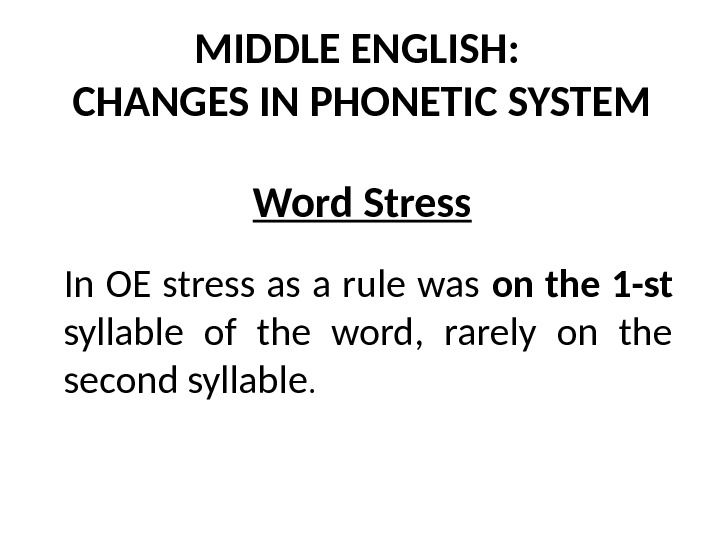
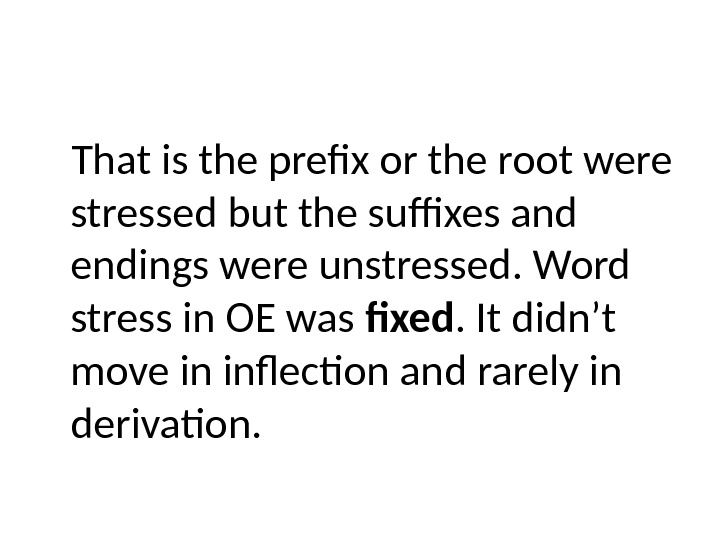
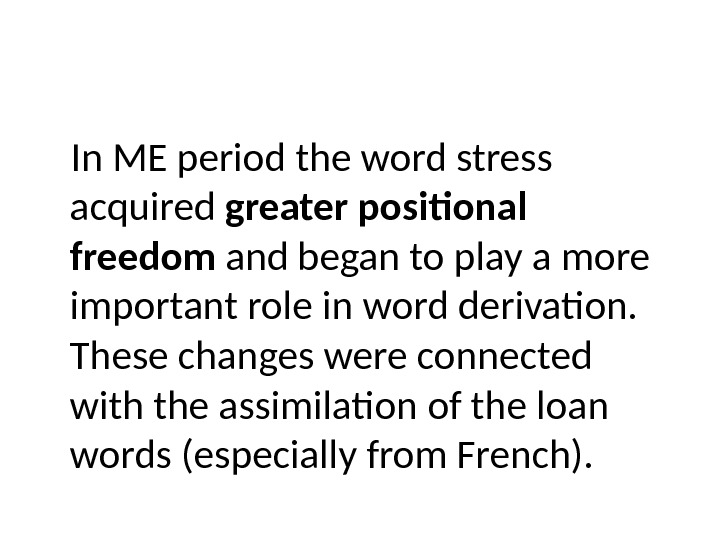
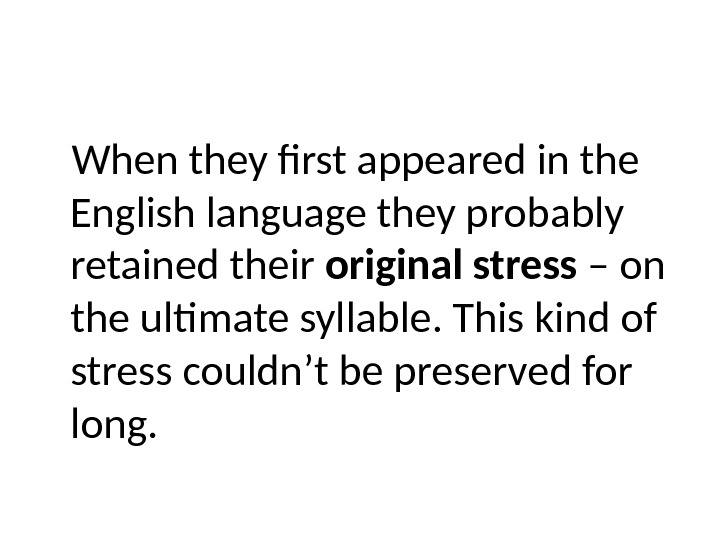
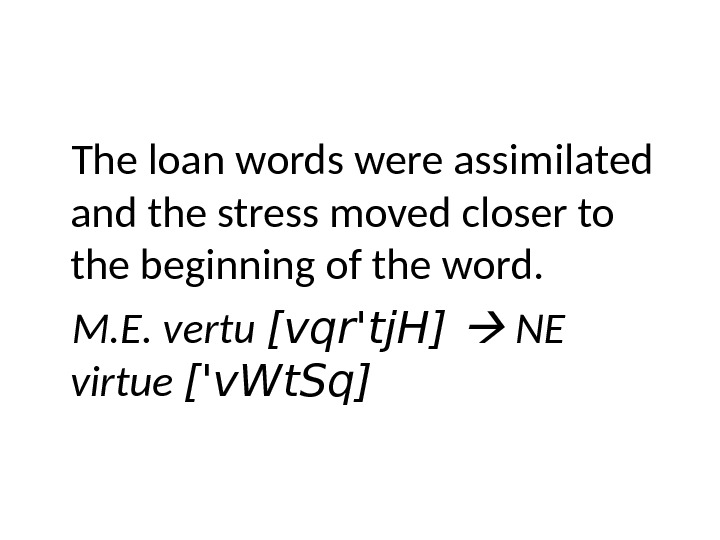
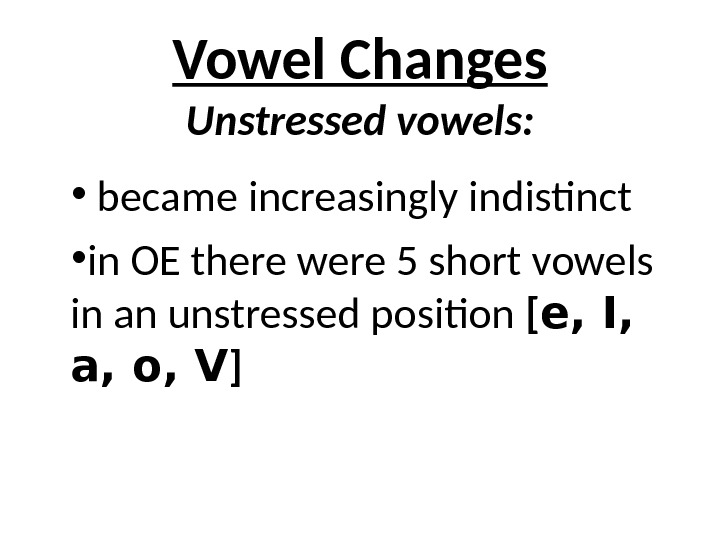
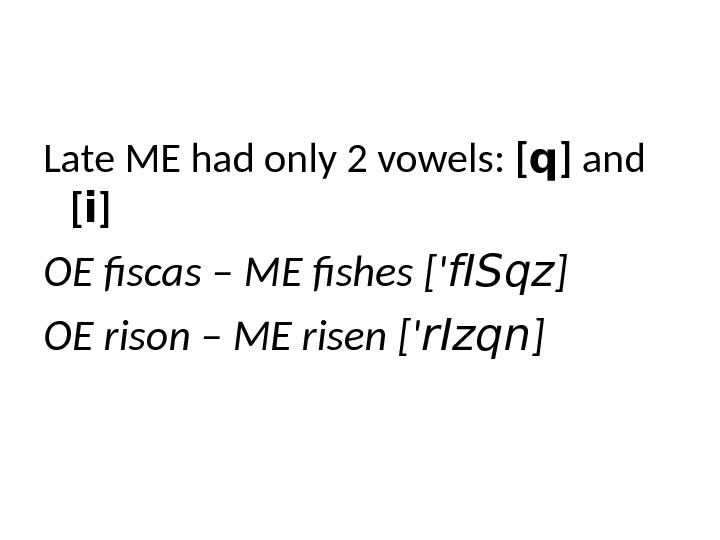
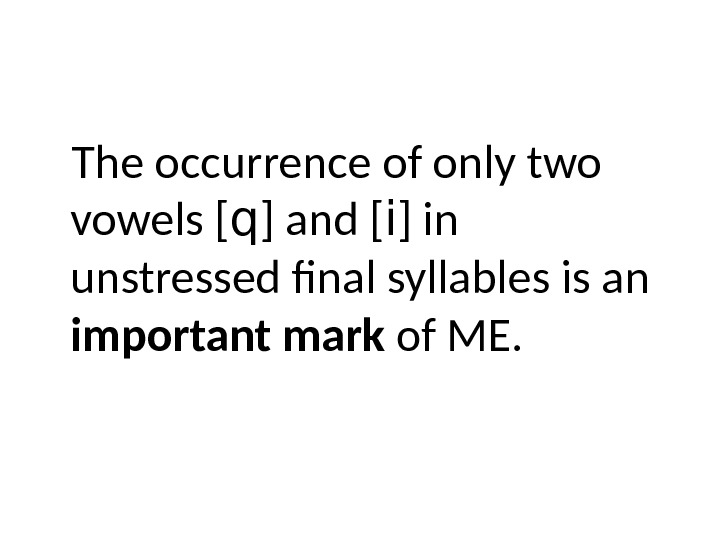
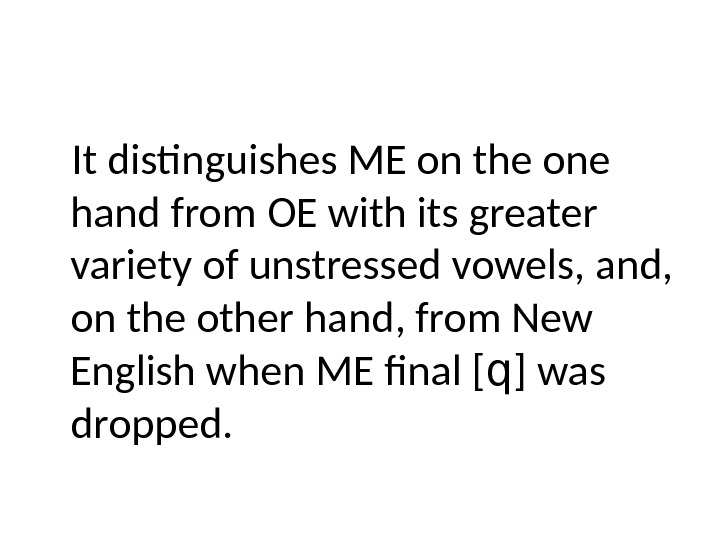
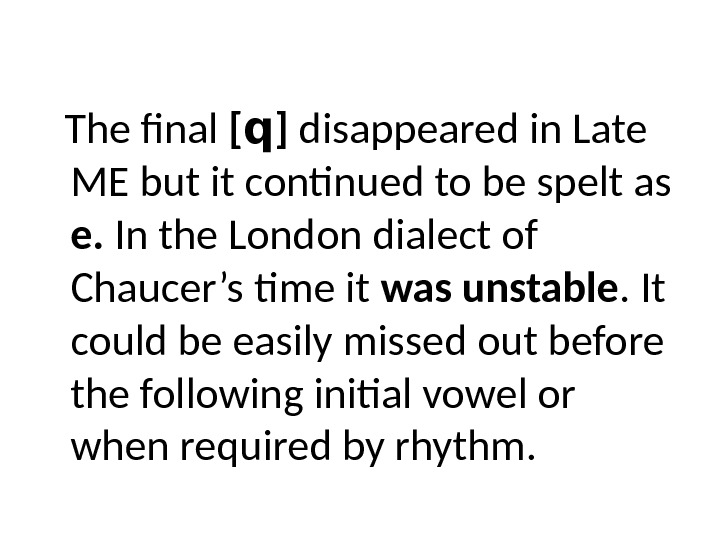
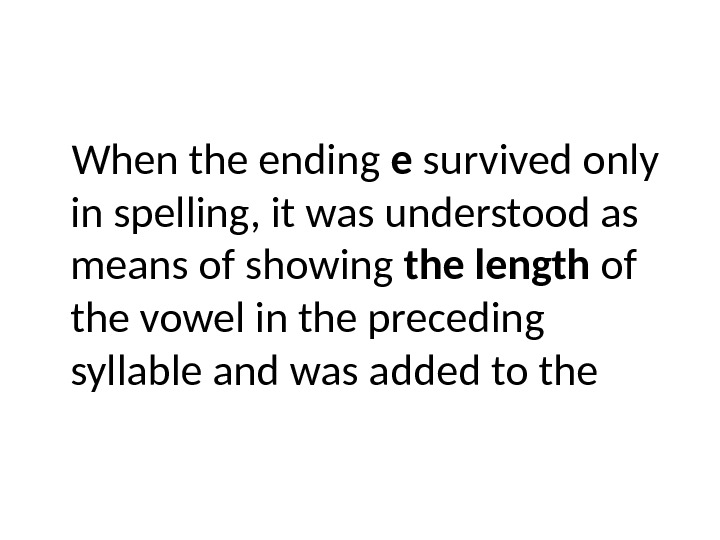
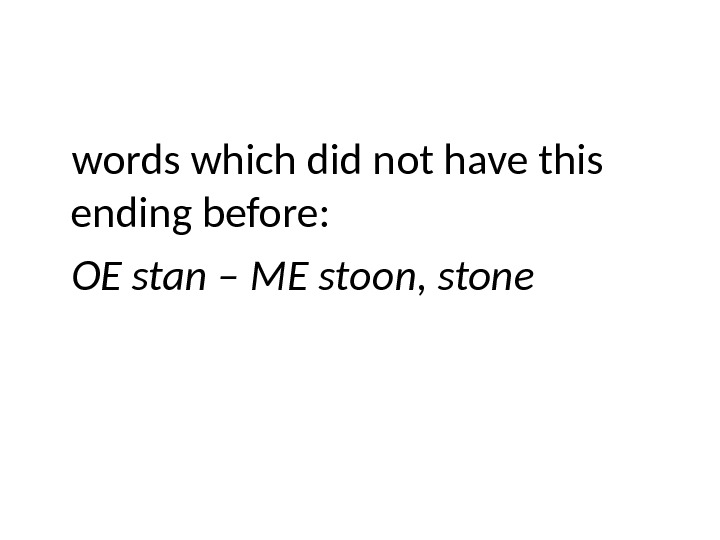
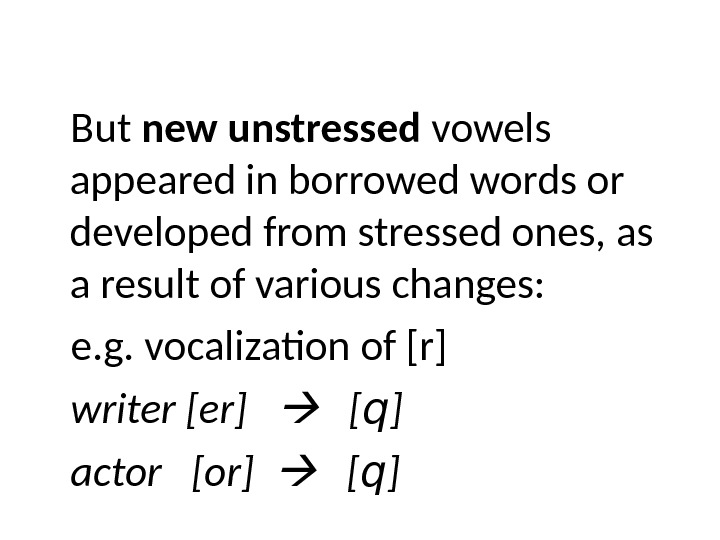
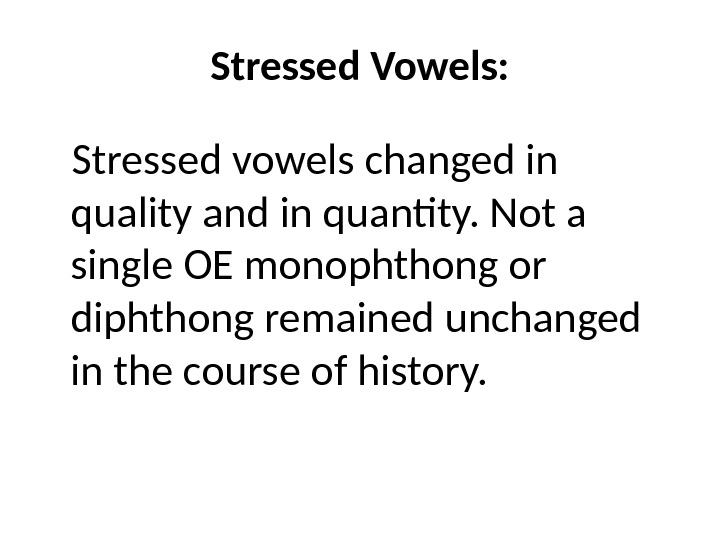
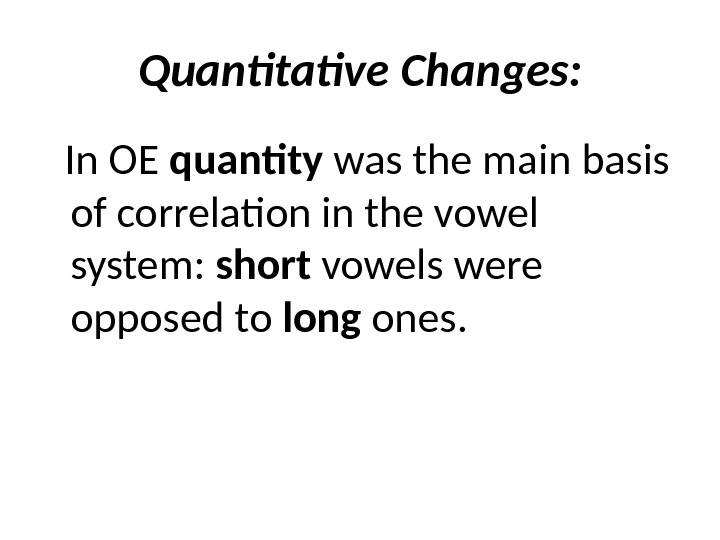
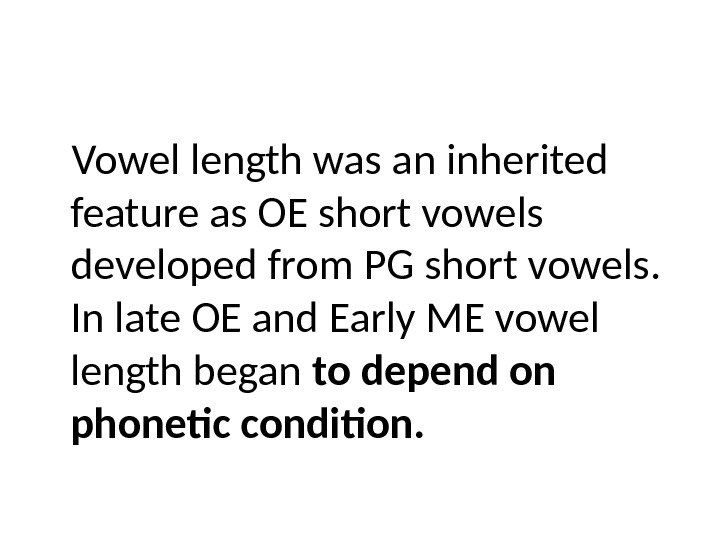
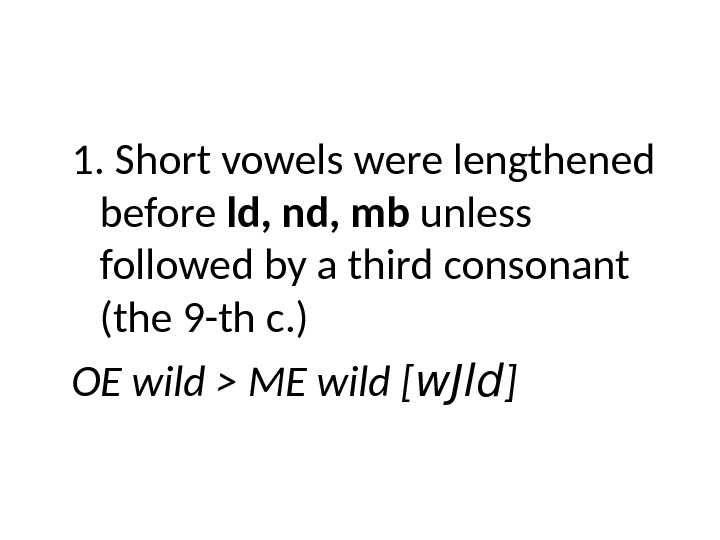
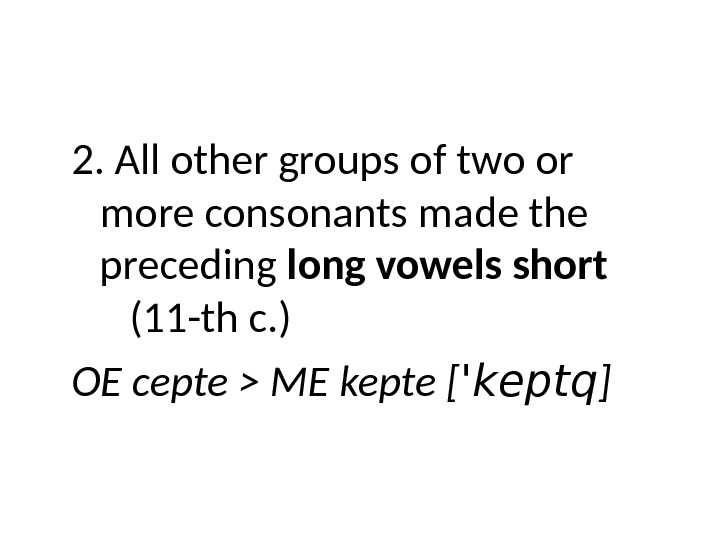
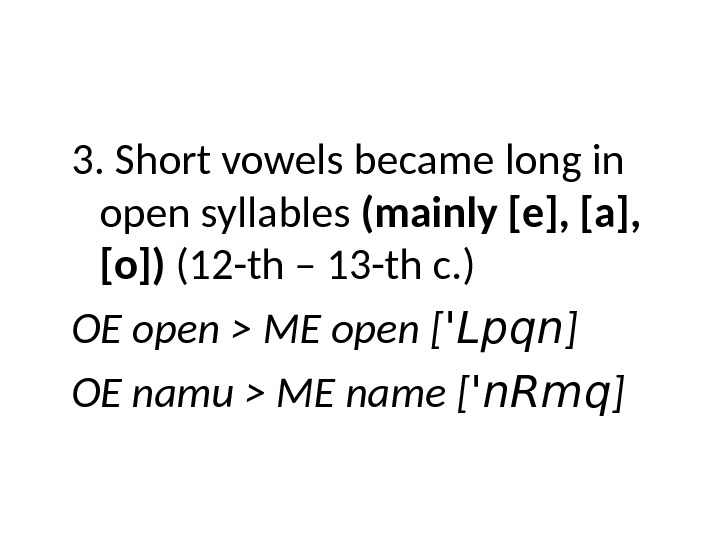
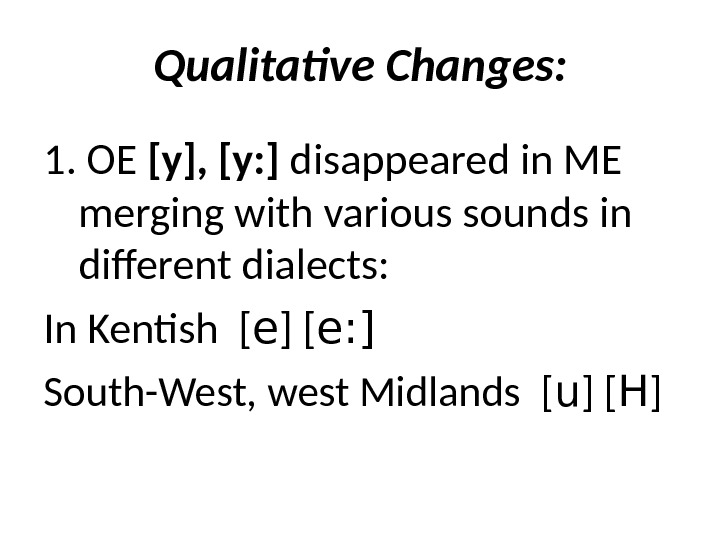
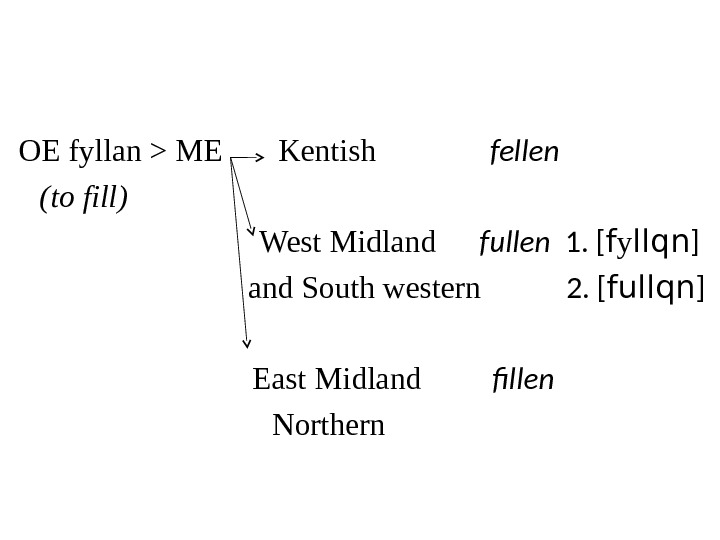
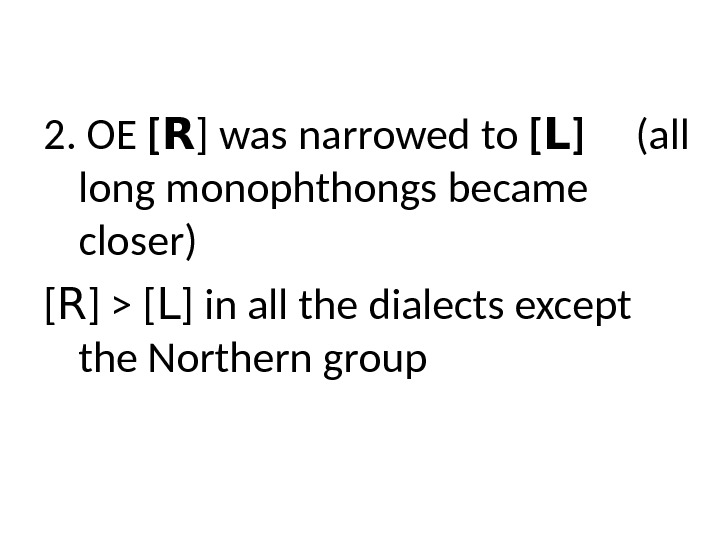
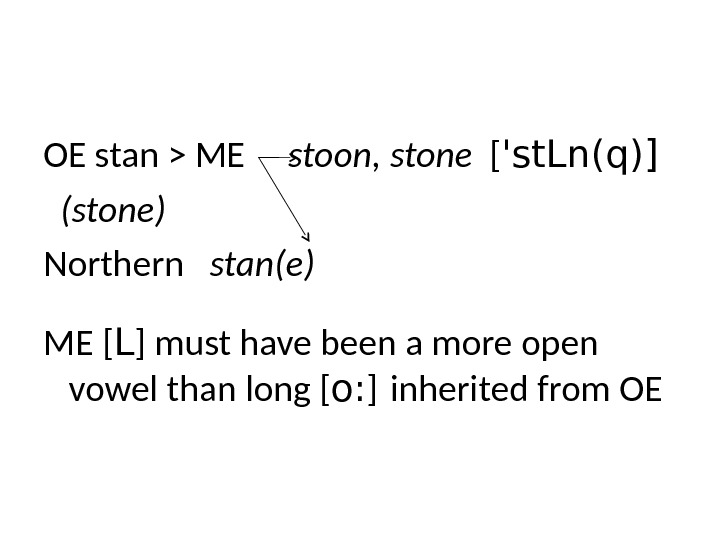
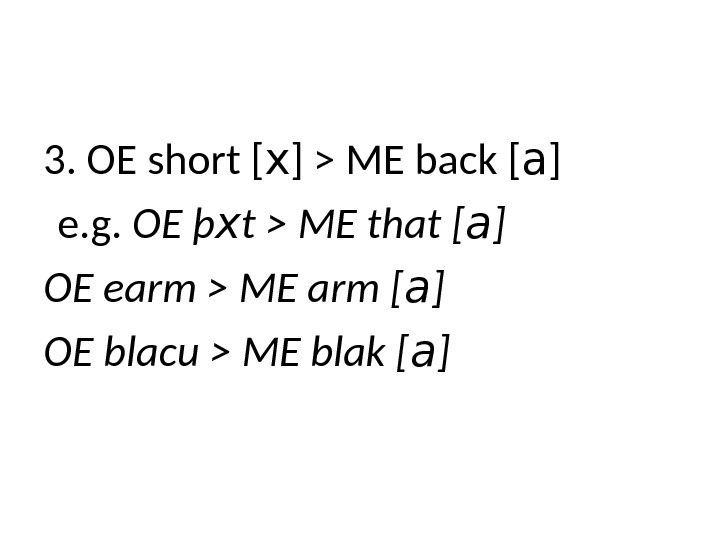
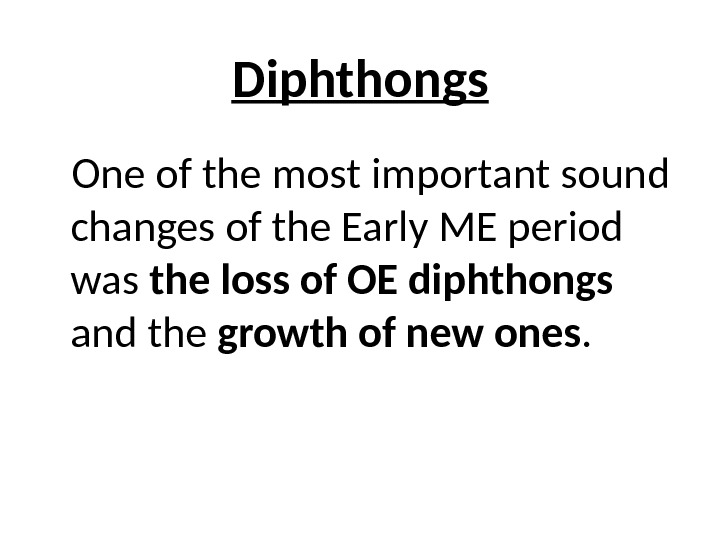
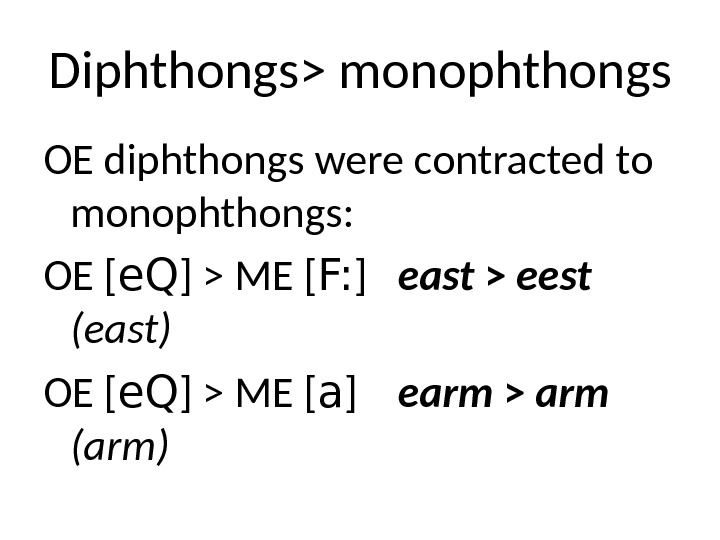
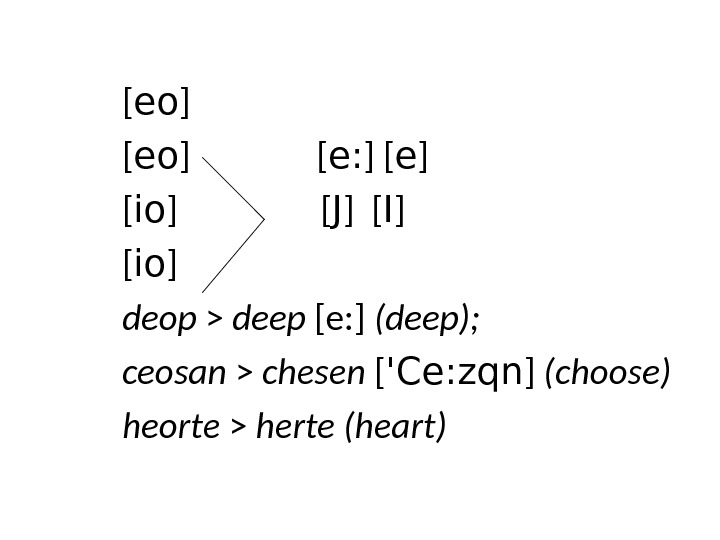
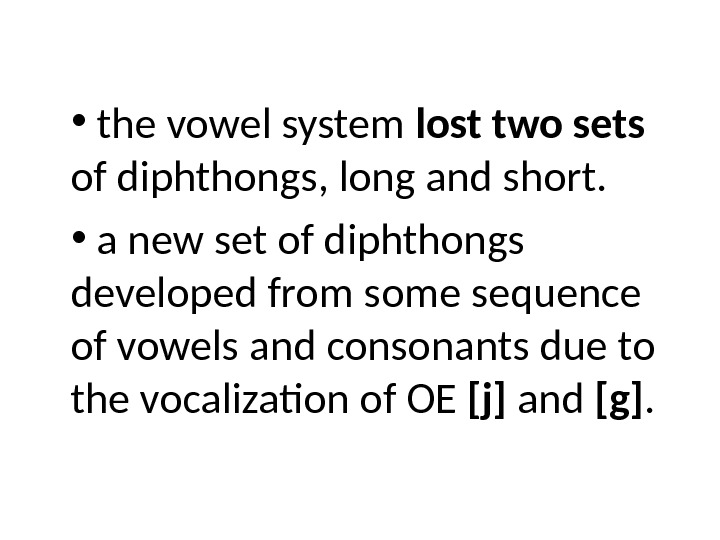
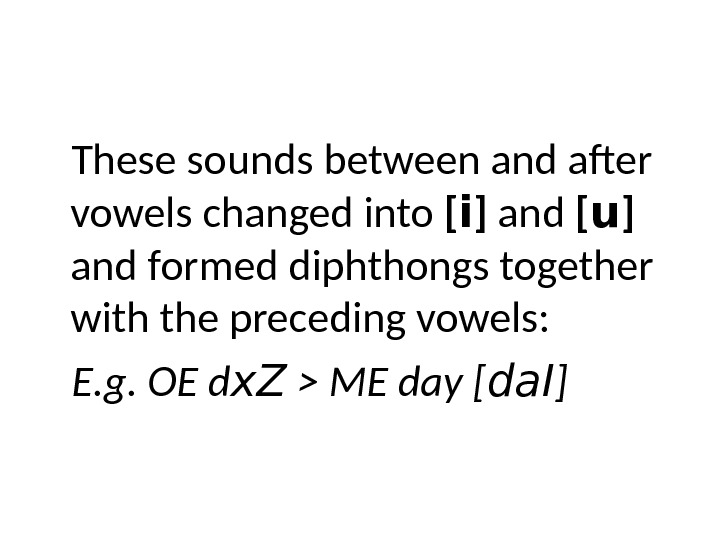
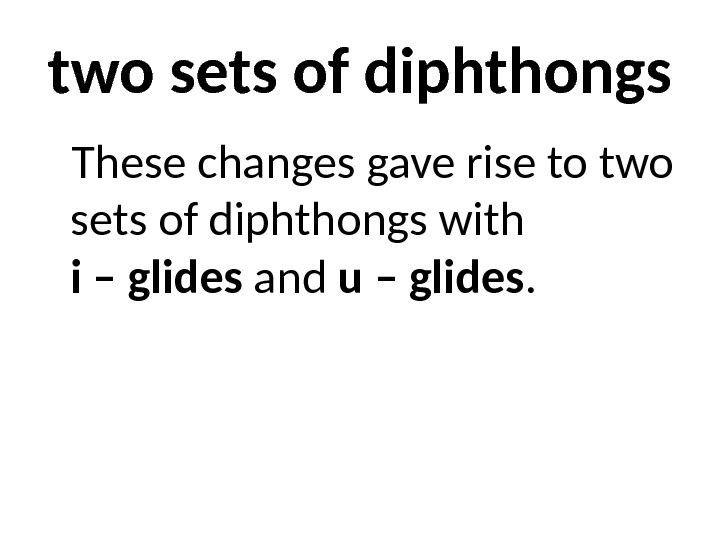
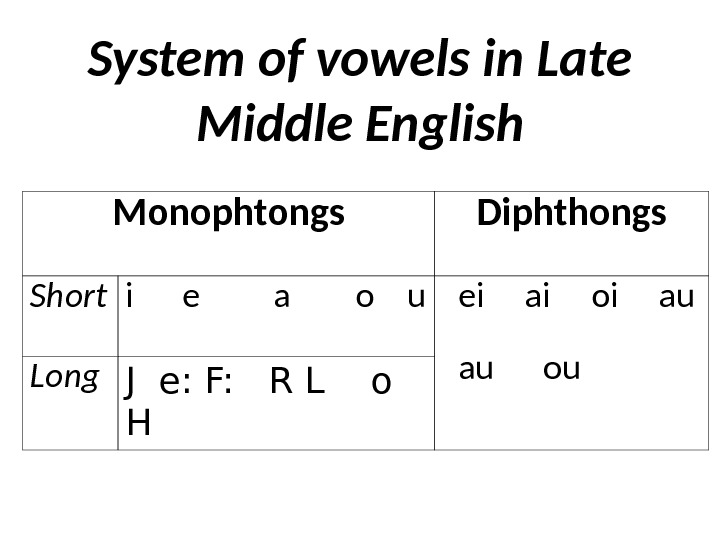
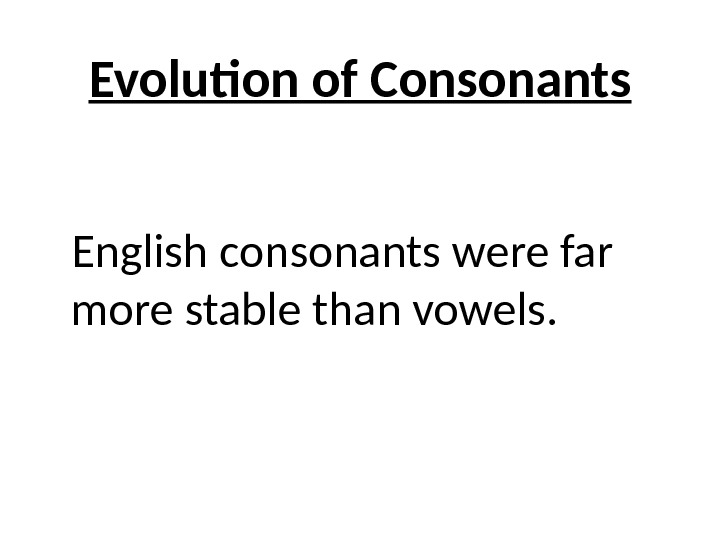
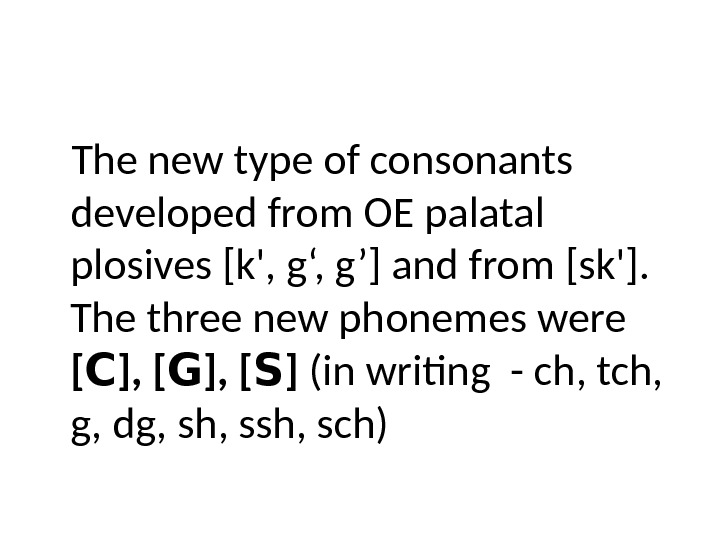
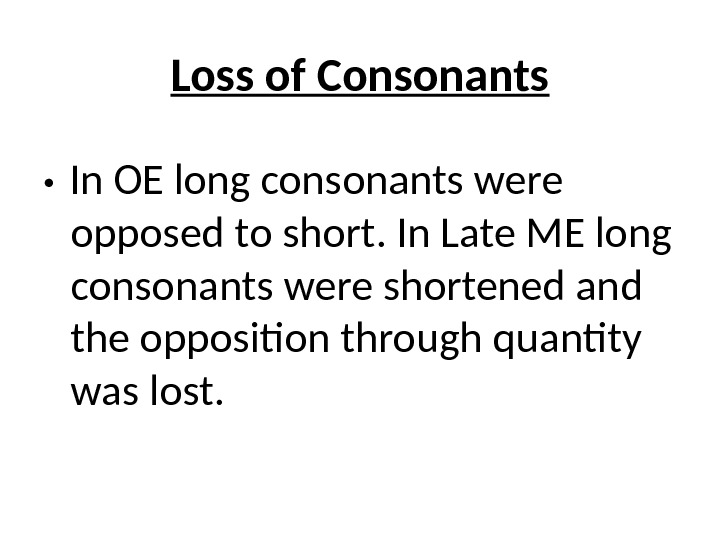
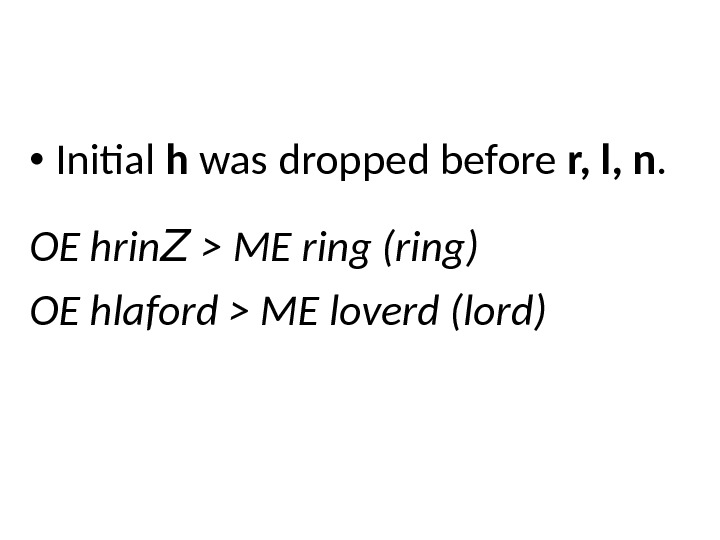
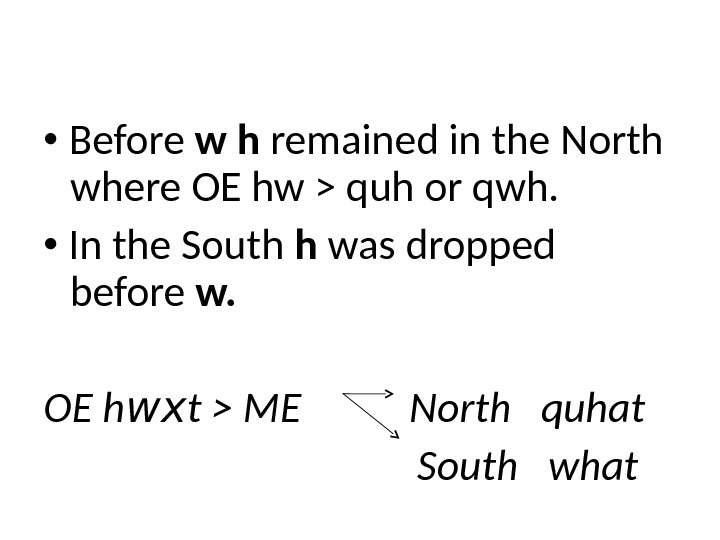
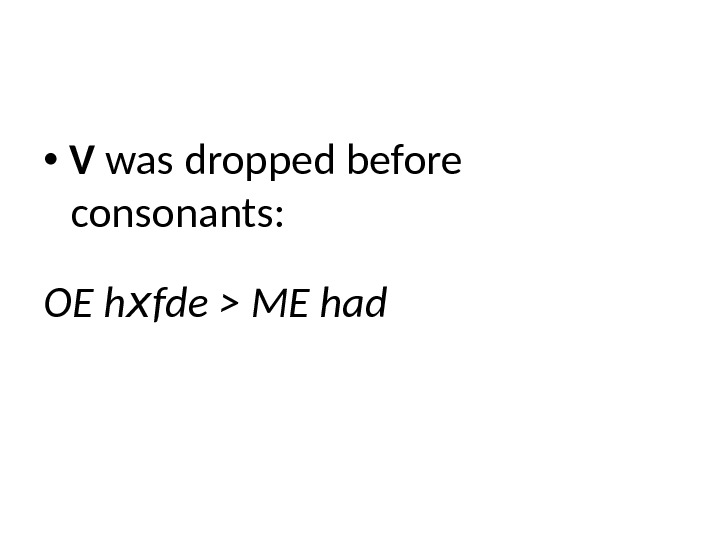
- Размер: 336.5 Кб
- Количество слайдов: 37
Описание презентации MIDDLE ENGLISH: CHANGES IN PHONETIC SYSTEM Word по слайдам
 MIDDLE ENGLISH: CHANGES IN PHONETIC SYSTEM Word Stress In OE stress as a rule was on the 1 -st syllable of the word, rarely on the second syllable.
MIDDLE ENGLISH: CHANGES IN PHONETIC SYSTEM Word Stress In OE stress as a rule was on the 1 -st syllable of the word, rarely on the second syllable.
 That is the prefix or the root were stressed but the suffixes and endings were unstressed. Word stress in OE was fixed. It didn’t move in inflection and rarely in derivation.
That is the prefix or the root were stressed but the suffixes and endings were unstressed. Word stress in OE was fixed. It didn’t move in inflection and rarely in derivation.
 In ME period the word stress acquired greater positional freedom and began to play a more important role in word derivation. These changes were connected with the assimilation of the loan words (especially from French).
In ME period the word stress acquired greater positional freedom and began to play a more important role in word derivation. These changes were connected with the assimilation of the loan words (especially from French).
 When they first appeared in the English language they probably retained their original stress – on the ultimate syllable. This kind of stress couldn’t be preserved for long.
When they first appeared in the English language they probably retained their original stress – on the ultimate syllable. This kind of stress couldn’t be preserved for long.
 The loan words were assimilated and the stress moved closer to the beginning of the word. M. E. vertu [vqr’tj. H] NE virtue [‘v. Wt. Sq]
The loan words were assimilated and the stress moved closer to the beginning of the word. M. E. vertu [vqr’tj. H] NE virtue [‘v. Wt. Sq]
 Vowel Changes Unstressed vowels: • became increasingly indistinct • in OE there were 5 short vowels in an unstressed position [ e, I, a, o, V ]
Vowel Changes Unstressed vowels: • became increasingly indistinct • in OE there were 5 short vowels in an unstressed position [ e, I, a, o, V ]
![Late ME had only 2 vowels: [ q ] and [ i ] OE fiscas Late ME had only 2 vowels: [ q ] and [ i ] OE fiscas](/docs//me_phonetics_images/me_phonetics_6.jpg) Late ME had only 2 vowels: [ q ] and [ i ] OE fiscas – ME fishes [‘ f. ISqz ] OE rison – ME risen [‘ r. Izqn ]
Late ME had only 2 vowels: [ q ] and [ i ] OE fiscas – ME fishes [‘ f. ISqz ] OE rison – ME risen [‘ r. Izqn ]
![The occurrence of only two vowels [ q ] and [ i ] in unstressed final The occurrence of only two vowels [ q ] and [ i ] in unstressed final](/docs//me_phonetics_images/me_phonetics_7.jpg) The occurrence of only two vowels [ q ] and [ i ] in unstressed final syllables is an important mark of ME.
The occurrence of only two vowels [ q ] and [ i ] in unstressed final syllables is an important mark of ME.
 It distinguishes ME on the one hand from OE with its greater variety of unstressed vowels, and, on the other hand, from New English when ME final [ q ] was dropped.
It distinguishes ME on the one hand from OE with its greater variety of unstressed vowels, and, on the other hand, from New English when ME final [ q ] was dropped.
![The final [ q ] disappeared in Late ME but it continued to be spelt as The final [ q ] disappeared in Late ME but it continued to be spelt as](/docs//me_phonetics_images/me_phonetics_9.jpg) The final [ q ] disappeared in Late ME but it continued to be spelt as e. In the London dialect of Chaucer’s time it was unstable. It could be easily missed out before the following initial vowel or when required by rhythm.
The final [ q ] disappeared in Late ME but it continued to be spelt as e. In the London dialect of Chaucer’s time it was unstable. It could be easily missed out before the following initial vowel or when required by rhythm.
 When the ending e survived only in spelling, it was understood as means of showing the length of the vowel in the preceding syllable and was added to the
When the ending e survived only in spelling, it was understood as means of showing the length of the vowel in the preceding syllable and was added to the
 words which did not have this ending before: OE stan – ME stoon, stone
words which did not have this ending before: OE stan – ME stoon, stone
 But new unstressed vowels appeared in borrowed words or developed from stressed ones, as a result of various changes: e. g. vocalization of [r] writer [er] [ q ] actor [or] [ q ]
But new unstressed vowels appeared in borrowed words or developed from stressed ones, as a result of various changes: e. g. vocalization of [r] writer [er] [ q ] actor [or] [ q ]
 Stressed Vowels: Stressed vowels changed in quality and in quantity. Not a single OE monophthong or diphthong remained unchanged in the course of history.
Stressed Vowels: Stressed vowels changed in quality and in quantity. Not a single OE monophthong or diphthong remained unchanged in the course of history.
 Quantitative Changes: In OE quantity was the main basis of correlation in the vowel system: short vowels were opposed to long ones.
Quantitative Changes: In OE quantity was the main basis of correlation in the vowel system: short vowels were opposed to long ones.
 Vowel length was an inherited feature as OE short vowels developed from PG short vowels. In late OE and Early ME vowel length began to depend on phonetic condition.
Vowel length was an inherited feature as OE short vowels developed from PG short vowels. In late OE and Early ME vowel length began to depend on phonetic condition.
 1. Short vowels were lengthened before ld, nd, mb unless followed by a third consonant (the 9 -th c. ) OE wild > ME wild [ w. Jld ]
1. Short vowels were lengthened before ld, nd, mb unless followed by a third consonant (the 9 -th c. ) OE wild > ME wild [ w. Jld ]
 2. All other groups of two or more consonants made the preceding long vowels short (11 -th c. ) OE cepte > ME kepte [ ‘keptq ]
2. All other groups of two or more consonants made the preceding long vowels short (11 -th c. ) OE cepte > ME kepte [ ‘keptq ]
![3. Short vowels became long in open syllables (mainly [e], [a], [o]) (12 -th – 3. Short vowels became long in open syllables (mainly [e], [a], [o]) (12 -th –](/docs//me_phonetics_images/me_phonetics_18.jpg) 3. Short vowels became long in open syllables (mainly [e], [a], [o]) (12 -th – 13 -th c. ) OE open > ME open [ ‘Lpqn ] OE namu > ME name [ ‘n. Rmq ]
3. Short vowels became long in open syllables (mainly [e], [a], [o]) (12 -th – 13 -th c. ) OE open > ME open [ ‘Lpqn ] OE namu > ME name [ ‘n. Rmq ]
![Qualitative Changes: 1. OE [y], [y: ] disappeared in ME merging with various sounds in different Qualitative Changes: 1. OE [y], [y: ] disappeared in ME merging with various sounds in different](/docs//me_phonetics_images/me_phonetics_19.jpg) Qualitative Changes: 1. OE [y], [y: ] disappeared in ME merging with various sounds in different dialects: In Kentish [ e ] [ e: ] South-West, west Midlands [ u ] [ H ]
Qualitative Changes: 1. OE [y], [y: ] disappeared in ME merging with various sounds in different dialects: In Kentish [ e ] [ e: ] South-West, west Midlands [ u ] [ H ]
 OE fyllan > ME Kentish fellen (to fill) West Midland fullen 1. [ f y llqn ] and South western 2. [ fu llqn ] East Midland fillen Northern
OE fyllan > ME Kentish fellen (to fill) West Midland fullen 1. [ f y llqn ] and South western 2. [ fu llqn ] East Midland fillen Northern
![2. OE [ R ] was narrowed to [ L ] (all long 2. OE [ R ] was narrowed to [ L ] (all long](/docs//me_phonetics_images/me_phonetics_21.jpg) 2. OE [ R ] was narrowed to [ L ] (all long monophthongs became closer) [ R ] > [ L ] in all the dialects except the Northern group
2. OE [ R ] was narrowed to [ L ] (all long monophthongs became closer) [ R ] > [ L ] in all the dialects except the Northern group
![OE stan ME stoon, stone [ 'st. Ln(q)] (stone) Northern OE stan ME stoon, stone [ 'st. Ln(q)] (stone) Northern](/docs//me_phonetics_images/me_phonetics_22.jpg) OE stan > ME stoon, stone [ ‘st. Ln(q)] (stone) Northern stan(e) ME [ L ] must have been a more open vowel than long [ o: ] inherited from O
OE stan > ME stoon, stone [ ‘st. Ln(q)] (stone) Northern stan(e) ME [ L ] must have been a more open vowel than long [ o: ] inherited from O
![3. OE short [ x ] ME back [ a ] e. g. 3. OE short [ x ] ME back [ a ] e. g.](/docs//me_phonetics_images/me_phonetics_23.jpg) 3. OE short [ x ] > ME back [ a ] e. g. OE þ x t > ME that [ a ] OE earm > ME arm [ a ] OE blacu > ME blak [ a ]
3. OE short [ x ] > ME back [ a ] e. g. OE þ x t > ME that [ a ] OE earm > ME arm [ a ] OE blacu > ME blak [ a ]
 Diphthongs One of the most important sound changes of the Early ME period was the loss of OE diphthongs and the growth of new ones.
Diphthongs One of the most important sound changes of the Early ME period was the loss of OE diphthongs and the growth of new ones.
![Diphthongs monophthongs OE diphthongs were contracted to monophthongs: OE [ e. Q ] ME [ Diphthongs monophthongs OE diphthongs were contracted to monophthongs: OE [ e. Q ] ME [](/docs//me_phonetics_images/me_phonetics_25.jpg) Diphthongs> monophthongs OE diphthongs were contracted to monophthongs: OE [ e. Q ] > ME [ F: ] east > eest (east) OE [ e. Q ] > ME [ a ] earm > arm (arm)
Diphthongs> monophthongs OE diphthongs were contracted to monophthongs: OE [ e. Q ] > ME [ F: ] east > eest (east) OE [ e. Q ] > ME [ a ] earm > arm (arm)
![[ eo ] [ e: ] [ e ] [ io ] [ eo ] [ e: ] [ e ] [ io ]](/docs//me_phonetics_images/me_phonetics_26.jpg) [ eo ] [ e: ] [ e ] [ io ] [ J ] [ I ] [ io ] deop > deep [e: ] (deep); ceosan > chesen [ ‘Ce: zqn ] (choose) heorte > herte (heart)
[ eo ] [ e: ] [ e ] [ io ] [ J ] [ I ] [ io ] deop > deep [e: ] (deep); ceosan > chesen [ ‘Ce: zqn ] (choose) heorte > herte (heart)
 • the vowel system lost two sets of diphthongs, long and short. • a new set of diphthongs developed from some sequence of vowels and consonants due to the vocalization of OE [j] and [g].
• the vowel system lost two sets of diphthongs, long and short. • a new set of diphthongs developed from some sequence of vowels and consonants due to the vocalization of OE [j] and [g].
![These sounds between and after vowels changed into [ i ] and [ u ] These sounds between and after vowels changed into [ i ] and [ u ]](/docs//me_phonetics_images/me_phonetics_28.jpg) These sounds between and after vowels changed into [ i ] and [ u ] and formed diphthongs together with the preceding vowels: E. g. OE d x. Z > ME day [ da. I ]
These sounds between and after vowels changed into [ i ] and [ u ] and formed diphthongs together with the preceding vowels: E. g. OE d x. Z > ME day [ da. I ]
 two sets of diphthongs These changes gave rise to two sets of diphthongs with i – glides and u – glides.
two sets of diphthongs These changes gave rise to two sets of diphthongs with i – glides and u – glides.
 System of vowels in Late Middle English Monophtongs Diphthongs Short i e a o u ei ai oi au ou Long J e: F: R L o H
System of vowels in Late Middle English Monophtongs Diphthongs Short i e a o u ei ai oi au ou Long J e: F: R L o H
 Evolution of Consonants English consonants were far more stable than vowels.
Evolution of Consonants English consonants were far more stable than vowels.
![The new type of consonants developed from OE palatal plosives [k', g‘, g’] and from [sk']. The new type of consonants developed from OE palatal plosives [k', g‘, g’] and from [sk'].](/docs//me_phonetics_images/me_phonetics_32.jpg) The new type of consonants developed from OE palatal plosives [k’, g‘, g’] and from [sk’]. The three new phonemes were [ C ], [ G ], [ S ] (in writing — ch, tch, g, dg, sh, sch)
The new type of consonants developed from OE palatal plosives [k’, g‘, g’] and from [sk’]. The three new phonemes were [ C ], [ G ], [ S ] (in writing — ch, tch, g, dg, sh, sch)
 Loss of Consonants In OE long consonants were opposed to short. In Late ME long consonants were shortened and the opposition through quantity was lost.
Loss of Consonants In OE long consonants were opposed to short. In Late ME long consonants were shortened and the opposition through quantity was lost.
 Initial h was dropped before r, l, n. OE hrin Z > ME ring (ring) OE hlaford > ME loverd (lord)
Initial h was dropped before r, l, n. OE hrin Z > ME ring (ring) OE hlaford > ME loverd (lord)
 Before w h remained in the North where OE hw > quh or qwh. In the South h was dropped before w. OE h wx t > ME North quhat South what
Before w h remained in the North where OE hw > quh or qwh. In the South h was dropped before w. OE h wx t > ME North quhat South what
 V was dropped before consonants: OE h x fde > ME had
V was dropped before consonants: OE h x fde > ME had

